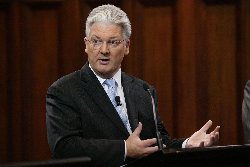BUSH IMPEACHMENT RESOLUTION INTRODUCED
Representative Yarborough, Illinois State Legislature Introduces Bill
Invokes Never Used Provision from Thomas Jefferson’s Rules
Sunday 23, April 2006
By Michael Collins
For “Scoop” Independent Media
Washington, DC
Representative Karen A. Yarbrough, a Democratic member of the Illinois State Assembly, introduced a resolution calling for the impeachment of President George W. Bush. House Joint Resolution 125 was introduced on April 20, 2006 with two co sponsors, Representatives Sara Feigenholtz and Eddie Washington, also both Democrats. Derided by Thomas Jefferson as “scarcely a scarecrow,” the presidential impeachment process is a rarity in United States history. The impeachment of federal judges is more common but also a rare event.
When invoked impeachment charges have always originated in the House of Representatives. After hearings, a vote is taken on each charge in the impeachment resolution. Given majority approval, a delegation from the House takes the case for impeachment to the Senate for a formal trial. The Chief Justice of the Supreme Court presides with House members serving as prosecutors, the president’s lawyers for the defense, and the Senators as the jury. Only Presidents Andrew Johnson and William Jefferson Clinton were impeached by the House of Representatives. In both cases, Senate trials failed to find them guilty of any charge.
Jefferson’s Revenge
There is a little known set of supplementary rules for both the US Senate and House of Representatives developed by Thomas Jefferson. Jefferson was clear on his opposition to centralized federal power and frequently sought balances giving states greater liberties and rights. Jefferson’s rules, Section 603, state:
Inception of impeachment proceedings in the House: … there are various methods of setting an impeachment in motion: by charges made on the floor on the responsibility of a Member or Delegate; by charges preferred by a memorial, which is usually referred to a committee for examination; by a resolution dropped in the hopper by a Member and referred to a committee; by a message from the President; by charges transmitted from the legislature of a State or territory or from a grand jury…”
The language in Jefferson’s parliamentary guidelines is clear. State legislatures can set “an impeachment in motion” with a “Joint Resolution” approved by the legislature (both the state Senate and Assembly). No state has taken advantage of this provision. In fact, it is so obscure; the majority of Vermont legislators who asked for impeachment did so in a formal letter to the House of Representatives rather than invoking Jefferson’s Rule 603.
Illinois Joint Resolution 125
Bush
is charged with the following “high crimes and misdemeanors”
in Representative Yarborough’s resolution
(summary):
1. Ordering the National Security Agency to spy on American citizens without a warrant (a “felony”).
2. Violating the Torture Convention of the Geneva Conventions, “a treaty regarded as supreme law by the United States Constitution;”
3. Holding American and other citizens as “prisoners of war without a charge or trial;
4. Manipulating intelligence to start the Iraq war “resulting in the deaths of large numbers of Iraqi civilians and causing the United States to incur loss of life, diminished security and billions of dollars in unnecessary expenses; and,
5. Leaking “classified national secrets to further a political agenda” thus exposing U.S. agents “to potential harm and retribution while simultaneously refusing to potential harm and retribution while simultaneously refusing to investigate the matter.”
Noting that the Republican controlled Congress failed to investigate the matter, the resolution invokes the powers under Section 603 of the Jefferson rules. The resolution reaches its summary by arguing that:
“the State of Illinois has good cause to submit charges to the U. S. House of Representatives under Section 603 that the President of the United States has willfully violated his Oath of Office to preserve protect and defend the Constitution of the United States; and be it furtherRESOLVED, That George W. Bush, if found guilty of the charges contained herein, should be removed from office and disqualified to hold any other office in the United States.
Each of these charges is a grave violation of the oath of office and some of them represent potential criminal charges against President Bush should he be impeached. The proposed action is unusual since it has two parts. Bush would both removed from office and “disqualified to hold any other office.”
Impeachment of a president or other federal office holder allows only for removal from office. Further financial penalties, jail time, etc. are optional for the president after he is removed from office. There is an ongoing debate over the ability of prosecutors to indict a sitting president. Although the language of the Constitution seems to allow this, there are points of tradition and interpretation used to argue against the practice.
Flight of Fancy or Emerging Reality
Bush’s popularity ratings have taken a nose for the past two years. The only point that he approached 50% was on Election Day 2004. For months prior to that day and subsequently, his popularity has trended downward. His most recent approval rating was only 33% as measured by the sympathetic Fox News public opinion poll. His disapproval rating is in the 60% range in almost all polls. Nearly two out of every three Americans strongly disapprove of Bush. State by state polling shows only four states in which Bush has an approval rating over 50%.
Despite this, the Democratic congressional delegation has been reluctant to even mention impeachment as a strategy. When Senator Russell Feingold, Democrat, Minnesota, introduced a Censure Resolution, he was criticized by Republicans and also some members of his own party. At this point, the bill proposed in Illinois has stimulated no comments from leaders of either party. Should the joint resolution pass, there is little doubt a major controversy will ensue.
Illinois is a state dominated by the Democratic Party. Democratic presidential candidates carried the state by 60% margins in the last two elections. The governor and the legislature are controlled by the Democrats. At this time, the likelihood of passage is unknown. Coverage has been almost exclusively on internet blogs and one national opinion magazine, The Nation, in an article by John Nichols.
The Illinois Resolution Sponsors



(Left to right) Illinois State Assembly Representatives Karen Yarborough, sponsor; Sara Feigenholtz and Eddie Washington, co-sponsors. All Democrats, the three representatives are from the Chicago area.
Karen Yarborough is from a political family. Her husband holds political office in their home town, Maywood. She is a “third generation entrepreneur,” as she describes herself and owns an insurance agency. Feigenholtz is a political and community activist form the north side of Chicago. Washington served in local government and as head of a regional Urban League chapter prior to his election in 2003. The three are all active in serving their constituents and not known as ideologues. Their action on April 20th will place them front and center in one of the greatest ideological struggles in American history. Should Illinois pass on the resolution, this novel story may emerge into a national issue of grave importance.
END


 Binoy Kampmark: The Australian Defence Formula, Spend! Spend! Spend!
Binoy Kampmark: The Australian Defence Formula, Spend! Spend! Spend! Ian Powell: New Hospital Building Trumps ‘Yes Minister’ Hospital Without Patients
Ian Powell: New Hospital Building Trumps ‘Yes Minister’ Hospital Without Patients Mike Treen: Prices Are Still Rising - It's A Cost Of Living Crisis
Mike Treen: Prices Are Still Rising - It's A Cost Of Living Crisis Gordon Campbell: On When Racism Comes Disguised As Anti-racism
Gordon Campbell: On When Racism Comes Disguised As Anti-racism Peter Dunne: Newshub And TVNZ Tip Of Media Iceberg
Peter Dunne: Newshub And TVNZ Tip Of Media Iceberg Harry Finch: Austerity – For And Against
Harry Finch: Austerity – For And Against